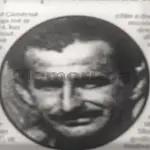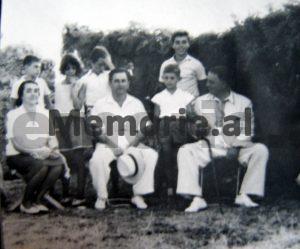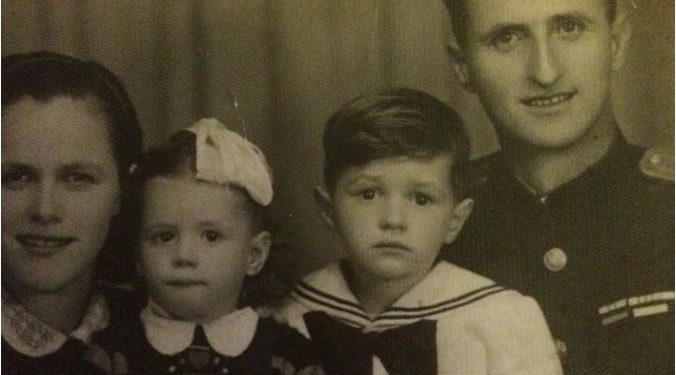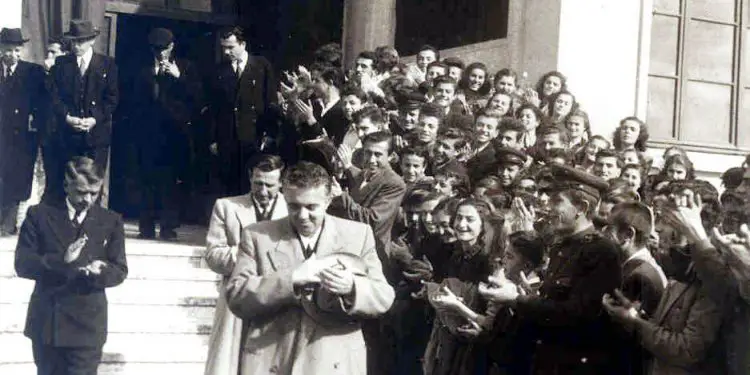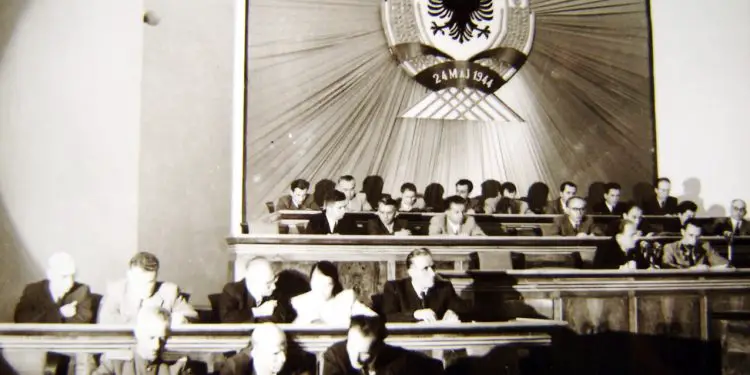By Ani Jaupaj
“Tim was poisoned in the hospital of Vlora, after at the Tirana Conference, in ’56, he criticized the privileges of the leadership in ‘Blok’, where he said about Nexhmije Hoxha…”/ The mystery of the death of the journalist from Çamëria
Memorie.al / Tefta Demi, it’s been less than a year since he returned from the United States, where he lived for more than 15 years. She found the situation around her father’s figure as she left it. No interest from anyone, either to find the remains or to have a grave, where to go and take a bunch of flowers. Tefta has the images she keeps of him firmly painted in her mind, even though she was only 5 years old when she saw him for the last time. He clearly remembers the day, when he was waiting for him at the window, he saw the black “Jeep” that took his father, never to return. But she remembers even more painfully the downward spiral that her family’s fate would take after that. It was not worth a single iota of the contribution that his father had made throughout his life, nor the positions he held, nor the efforts for a better life. His statement against the Party was stronger than all.
“Comrades from above are overly bureaucratized and, when it comes to contacts at work, I will bring you our case: at Radio Tirana, it is an important institution for propaganda. By car, it is only six minutes away from the offices of the Central Committee. But in these 6-7 years, my friend Nexhmije, director of Agitation-Propaganda, has come to it only 2-3 times. Comrade Liri Belishova, since she became Agjit-prop’s secretary, has never come to Radio.
How can you run the subordinate sector from the office, only by calling the director, without contacting the employees or, at least, the Collegium? Another remark: when delegations are sent abroad, there are some names that come up very often: Liri Tashko, Vito Kapo, Eleni Terezi, Pilo Peristeri, Fadil Paçrami, and some others, like our privileged director, friend Petro Kita , which is now located in Berlin”.
This is what Vehip Demi, the head of the Culture editorial office at Radio Tirana and the former partisan of the “Chameria” battalion, said, among others, at the end of his discussion at the Tirana Party Committee Conference in 1956 who, in his words full of harsh criticism about the wrong political line that the ALP was following and the privileges of its leadership, ignited debates between the delegates and the Presidium of that conference.
As a result of that attitude, a few days later, Vehip Demi was dismissed from all the functions he held and was declared an anti-party person, appearing ninth in the list of 21 persons that was approved by Enver Hoxha. After that, he was first interned in the district of Skrapar and then in Vlora, where he died under mysterious circumstances, in 1960, shortly after the arrests of the so-called “Teme Sejkos Cham Group” had begun.
The circumstances of Vehipi’s death were suspicious, but his relatives, who remained in exile until 1991, testify that he was poisoned by the State Security, which also took care to hide the traces of his death.
Ms. Tefta, how old was you when this silent trial was being held for your father?
I was very small, 2-3 years old. From this stage, you cannot save memories. For me, the memories start in the next phase, when we were transferred from Tirana, and we were interned in Çorovodë.
Familiarly, including the father?
Yes, all six, mother, father and four children. First an attempt was made to separate the mother from him, but this was not done, so we all went after him. There we lived in one room, no one spoke to us, did not approach us, but mother and father started working and we did not suffer from hunger or other basic deficiencies.
Would these deficiencies appear later?
Not for us, because that’s how things went. We lived like this until the next attack came. I remember that day well. With my brother, we were waiting at the window ledge, for mother and father to appear. We did this every day, we waited for them there. That day, the father could not enter the house. A “Jeep” vehicle cut his way and took him away. The mother was told that she would be returned, but that was not the case.
How did it happen?
The next day, people came again to the room where we lived, to take blankets, mattresses. What they said was only: “We have isolated him in Zvrnec, Vlora”. After some time, the mother was told that she could go see her at the hospital in Vlora. On that visit, mother took me and my brother with her. I remember that he was lying in bed, with a towel on his head, two policemen on the side of the bed, trying to play with an orange with my brother, who was younger than me.
The father gestured to the mother, as if to say; “I’m finishing”. After this time, my mother didn’t take me with her anymore; she only took my brother, because there was no one to take care of him. On the return of one of these visits, the mother told us that; father would not come again. The neighbors who had come out to ask about the body, the mother told them that they would not give it to them. On the last trip, he had not met him; he had been told that; you had died in prison.
What happened to you after that?
The mother was removed from the bookstore where she was selling and made to work with a pickaxe. We were ultimately the children of the “enemy of the people”. Our mother tried to bring us to our father, to our grandfather, who lived in Tirana, but they wouldn’t let us, they turned us away from the street, until he was the one who thought of another solution.
What was it?
That the mother would remarry and we would be considered abandoned. That way we could live with it, once and for all.
How old was the mother?
He was only 27 years old and he did just that. She married someone else, while we lived with my grandfather.
Was he coming to see you?
He came, but secretly, because they didn’t allow him.
So you were separated from both parents?
Yes, however, we grew up with grandfather’s love, even though we couldn’t have a life like others. Be it in terms of education or relationships with people. Father’s people were scared, to keep us close. We tried to study hard at school, but the right to higher studies was almost never given to us. So, apart from living in the city, we were completely deprived of everything else.
Did you hear me talking about what happened to my father?
We heard it constantly, because Enver Hoxha took care to mention and defame his figure, almost in every article or publication he published. We were terrified, every time we heard that some new work would come out of him.
Did the mother continue to live in exile even after her second marriage?
Yes, yes, the other man was there, so he lived in exile.
Did you restore the relationship?
After the release, she left for America, but we were constantly connected with her. So much so that she made it possible for me to emigrate there for many years. I just came back a year ago.
Is the mother alive?
Yes, he continues to live in America, with the son he had from his second marriage. One of my brothers also lives there.
From the death of the father, you managed to receive only the news. Did you become interested after 90 in finding the body or any clues about his murder?
Undoubtedly yes. As soon as we had the opportunity, we searched for documents in the State Archives, but the father was not convicted. We also searched the Ministry of the Interior, but we couldn’t find anything, so he had been convicted, with unwritten laws. These were the methods Enver Hoxha used for people who opposed him. As I was telling you, after we did not find any documents, in 1994 we went to the Vlora hospital and asked for the file. After many difficulties, we found the card, in which it was written that the cause of death was the refusal to eat and drink, supposedly this is how he died.
A possible variant would have been poisoning, wouldn’t it?
There is no way he could have died otherwise; they themselves took him to death, in a very short time. As I heard my grandfather then, one of the reasons for his murder was that he was a Cham, in addition to the open objections he made at the Tirana Conference. He could not let it pass, when he knew that his father had taken the demands for the recognition of Cham rights to the UN.
Even to this day, you haven’t found any information about him?
No, and that’s what kills me the most. 20 years have passed and no one has remembered to paint his figure in the country. I don’t have many claims, except to have a grave where I can take a bouquet of flowers. Finally, I am the daughter of a democrat, who died to live in democracy and whose name is never mentioned today. His figure has not yet been recognized and I will fight as hard as I can to achieve this.
Vehip Demit’s discussion at the Tirana Conference: “Here are the privileges of the ‘Block’ of leadership, Nexhmija has forgotten us”!
“We agree with the expressed opinion that the contacts and connections of the leaders with the masses should be strengthened. It happens that close comrades of the war or of work, illegally, have left each other, without any reason: one is a minister, the other an employee. You don’t see the minister anywhere; he leaves the house by car, returns by car, and goes out with his family on Sundays by car.
During the war, did we think that we would allow ourselves such a disconnection? Never! Radio-Tirana is an important institution for propaganda. By car it is only six minutes away from the offices of the Central Committee. But in these 6-7 years, my friend Nexhmije, director of Agitation-Propaganda, has come to it only 2-3 times.
As journalists, we have closely observed the economic difficulties of the employees who have come from a lot of measures, such as the partial removal of the taxes, the new categorization, the establishment of new norms, the social security law. We consider these measures fair and dictated by our real conditions. But, at the same time, we think that these should have been taken all at once. At the same time, the salaries of middle and senior officials were increased.
In radio, we have such a phenomenon: those who received from 5,200 ALL higher all have a salary supplement. Couriers, cleaners, porters, do not have any extra. This means that, in us, the disparity between those who receive high and low salaries has increased. Comrade Beqir insisted that the issue of block supply was decided by the Central Committee. We think that in this matter, the principle “each according to his work” is violated.
If the minister gives more to the society and the society rewards him rightly, how can the privilege given to the minister’s wife, by giving her food in the “Block” are justified? My friend Shuaip Panariti studies abroad and his wife, who doesn’t work at all, get food by the block. So, don’t give society anything and get a lot from it!
We have in our organization, friend Violeta Papuli, communist and partisan. Her husband, Çoti, was the editor-in-chief of “Bashkim” and studies in Moscow. Violet now got the block. She says: “I am ashamed of the women of the cooperative, to buy food in bulk, because I feel that it is a favor to me.” Medar Shtylla’s friend, one day, was buying lamb. The meat part, there was also some liver.
She tells the seller: “Don’t give me the liver, because we don’t eat it and I don’t have a cat to throw it to.” We don’t have the guts to supply the people; she complains that there are no cats. We want to ask the Minister of Trade, Kiço Ngjela and the Minister of Finance, Abdy Këllezi, where the funds needed to cover the expenses of the “Block” comes from. We cannot hide this, because we do not see the existence of the Block as right. One more thing: We think that the prices of industrial goods are too high”. Memorie.al




